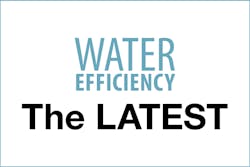Barclays and The Columbia Water Center Launch New Study, Reveal How Energy Companies and Public Utilities Can Help Protect and Improve Water Resources in the US
Second report in Impact Series explores how oil and gas operators, the utility industry and governments can work together to improve transparency around water usage, invest in innovative technologies, and improve data collection
In recognition of UN World Water Day, Barclays Bank PLC (“Barclays”) and the Columbia Water Center today released the second report of the Impact Series from the Barclays Social Innovation Facility. Titled The water challenge: preserving a global resource, the report explores the extent of the water challenge and how oil and gas operators, the utility industry and governments –all large consumers and users of water – can take advantage of opportunities to become more efficient and sustainable in its water management.
This report shows that robust water management, combined with innovative technologies and forward-looking practices, will not only be good for the environment and society, but can also benefit companies’ bottom lines.
Acknowledging this year’s World Water Day theme of “Wastewater,” the report also examines how companies can apply best practices and new technologies to reuse or recycle the wastewater they create in the course of their business. In fact, the research shows that companies that implement sustainable water practices, such as reusing water and building efficient infrastructure, will lessen the contribution to freshwater scarcity and quality issues.
“Water scarcity is an enormous and undeniable challenge for both society and the environment, but also presents an opportunity for sustainable investment,” said Zachary Sadow, energy equity research analyst at Barclays. “The water challenge report demonstrates the crucial need for investment in water-related technologies and infrastructure that enable oil and gas operators, the utility industry and governments to treat wastewater effectively as a resource. Ultimately, the companies that can reduce freshwater usage and costs will be best positioned for an uncertain water future.”
“Because the water, energy and utility industries are so deeply interconnected, improved water management is crucial to companies’ supply chains and futures,” said Upmanu Lall, Director of the Columbia Water Center. “By examining industry growth and analyzing data on water consumption by industry, research in The water challenge identifies sustainable and efficient solutions that protect our resources by reducing both energy and water usage.”
Key findings of the report include:
The oil and gas industry can substantially increase water reuse. By mirroring the success of countries such as Canada, where regulations mandate water reuse and limit fresh water acquisition for oil sands operations, the U.S. may be able to follow suit.
U.S. government research and development (R&D) for new technologies and funding of crucial accounting agencies represent critical public sector functions to complement private sector investment and initiatives. Because larger companies have R&D budgets for water technologies, smaller companies should receive support from government agencies to engage in progressive water practices. Additionally, enforcing and standardizing water reporting across industries will help improve water management.
Policy and economics will be the biggest drivers of innovation for power and water utilities. In an uncertain regulatory future, utilities that incorporate water risk planning into their strategic planning and engage in integrated water resources management will be better prepared for unforeseen water supply shocks.
The infrastructure crisis in the water utility industry needs immediate attention. There is significant opportunity for public-private partnerships and capital investment in the water utilities industry, and collective action is needed to improve transparency and encourage investment in innovative technologies.
Evidence shows that energy companies can be encouraged to put effort into R&D for technologies that benefit all. There is a variety of technologies that can transform alternative sources of water into industrial use, including desalination, recycling effluent water, indirect and direct potable reuse, advanced metering infrastructure, lead detecting technologies and dry cooling.
About Barclays’ Social Innovation Facility
The Barclays Social Innovation Facility is a catalyst for the development of innovative products and services that deliver both an ongoing commercial return and a sustained social impact. It was launched in 2012 and is a key part of the firm’s Shared Growth Ambition. The Impact Series is designed to explore the social impact of economic, demographic and disruptive changes affecting markets, sectors and society at large.
About Barclays
Barclays is a transatlantic consumer, corporate and investment bank offering products and services across personal, corporate and investment banking, credit cards and wealth management, with a strong presence in our two home markets of the UK and the US. With over 325 years of history and expertise in banking, Barclays operates in over 40 countries and employs approximately 130,000 people. Barclays moves, lends, invests and protects money for customers and clients worldwide.

